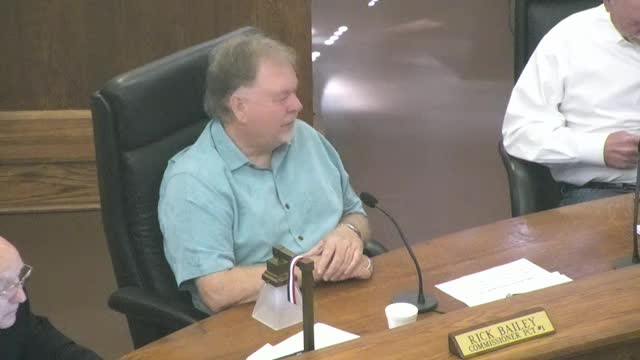Johnson County constables advocate for staffing changes amid increasing workload and evictions
August 06, 2025 | Johnson County, Texas
This article was created by AI summarizing key points discussed. AI makes mistakes, so for full details and context, please refer to the video of the full meeting. Please report any errors so we can fix them. Report an error »

In a recent meeting of the Johnson County Special Commissioner's Court, significant discussions centered around law enforcement staffing and environmental management, reflecting the evolving needs of the community. The meeting, held on August 6, 2025, highlighted the challenges faced by constables and the implications of potential staffing changes.
One of the primary topics was the management of hazardous materials and the need for increased law enforcement presence in rural areas. A constable recounted an incident involving hazardous waste left on a road, which impeded roadwork and underscored the importance of having law enforcement readily available to address such issues. The constable emphasized the necessity of having "boots on the ground" to effectively manage environmental concerns and public safety, particularly in rural Johnson County.
The court also discussed the current staffing levels across precincts, revealing disparities in the number of sworn officers. Precinct 1 has five officers, including an environmental officer, while other precincts have fewer. This discrepancy raises questions about resource allocation and the ability to meet growing demands, especially as the county continues to expand. The conversation included considerations for eliminating reserve positions within the constable's offices, which some members supported as a means to streamline operations and reduce liability.
Constable Crawford from Precinct 2 shared insights into the unique challenges his precinct faces, particularly in serving court papers and managing court security. He noted that the workload has increased significantly, with a doubling of court dockets over the past two years. The introduction of an evening shift deputy has proven effective in serving papers, but the need for additional clerical support remains critical to manage the growing caseload.
The discussions also touched on the role of private process servers and their impact on constable workloads. It was noted that many cases are referred to constables when private servers are unable to complete their tasks, further straining resources. The court acknowledged the need for potential legislative changes to address the challenges posed by private process servers and their fees.
As the meeting concluded, the court recognized the importance of addressing these staffing and operational challenges to ensure effective law enforcement and environmental management in Johnson County. The discussions set the stage for future decisions regarding personnel and resource allocation, with an emphasis on adapting to the county's growth and evolving needs.
One of the primary topics was the management of hazardous materials and the need for increased law enforcement presence in rural areas. A constable recounted an incident involving hazardous waste left on a road, which impeded roadwork and underscored the importance of having law enforcement readily available to address such issues. The constable emphasized the necessity of having "boots on the ground" to effectively manage environmental concerns and public safety, particularly in rural Johnson County.
The court also discussed the current staffing levels across precincts, revealing disparities in the number of sworn officers. Precinct 1 has five officers, including an environmental officer, while other precincts have fewer. This discrepancy raises questions about resource allocation and the ability to meet growing demands, especially as the county continues to expand. The conversation included considerations for eliminating reserve positions within the constable's offices, which some members supported as a means to streamline operations and reduce liability.
Constable Crawford from Precinct 2 shared insights into the unique challenges his precinct faces, particularly in serving court papers and managing court security. He noted that the workload has increased significantly, with a doubling of court dockets over the past two years. The introduction of an evening shift deputy has proven effective in serving papers, but the need for additional clerical support remains critical to manage the growing caseload.
The discussions also touched on the role of private process servers and their impact on constable workloads. It was noted that many cases are referred to constables when private servers are unable to complete their tasks, further straining resources. The court acknowledged the need for potential legislative changes to address the challenges posed by private process servers and their fees.
As the meeting concluded, the court recognized the importance of addressing these staffing and operational challenges to ensure effective law enforcement and environmental management in Johnson County. The discussions set the stage for future decisions regarding personnel and resource allocation, with an emphasis on adapting to the county's growth and evolving needs.
View full meeting
This article is based on a recent meeting—watch the full video and explore the complete transcript for deeper insights into the discussion.
View full meeting
